Psychological Theories and Behavior Disturbances: A Case Study
VerifiedAdded on 2023/04/23
|12
|849
|310
Case Study
AI Summary
This case study explores the application of various psychological theories to understand the behavior of individuals within a family facing multiple challenges. It examines Karen's husband's schizophrenia through a psychodynamic perspective, linking his alcoholism and gambling to unconscious desires. Karen's daughter's bulimia is analyzed using the contextual perspective, highlighting the influence of societal ideals on her eating disorder. The evolutionary perspective is applied to Karen's son's autism spectrum disorder, attributing it to inherited genetic traits. Finally, Karen's stress and anxiety are examined through a behavioral perspective, linking her emotional state to the environmental stressors caused by her family's medical conditions. The study also provides references to support the theoretical applications and analysis of behavior disturbances.
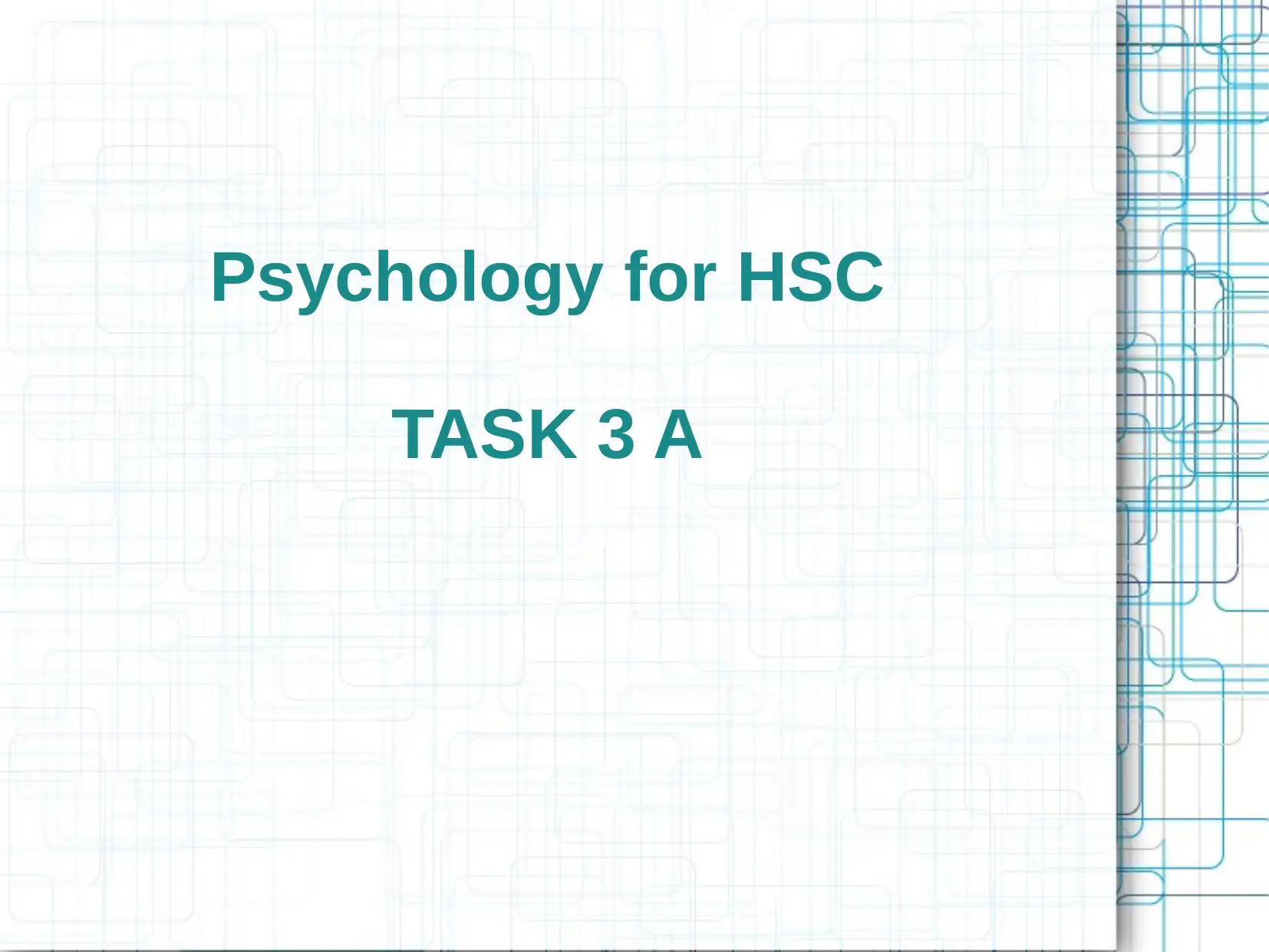
Psychology for HSC
TASK 3 A
TASK 3 A
Paraphrase This Document
Need a fresh take? Get an instant paraphrase of this document with our AI Paraphraser
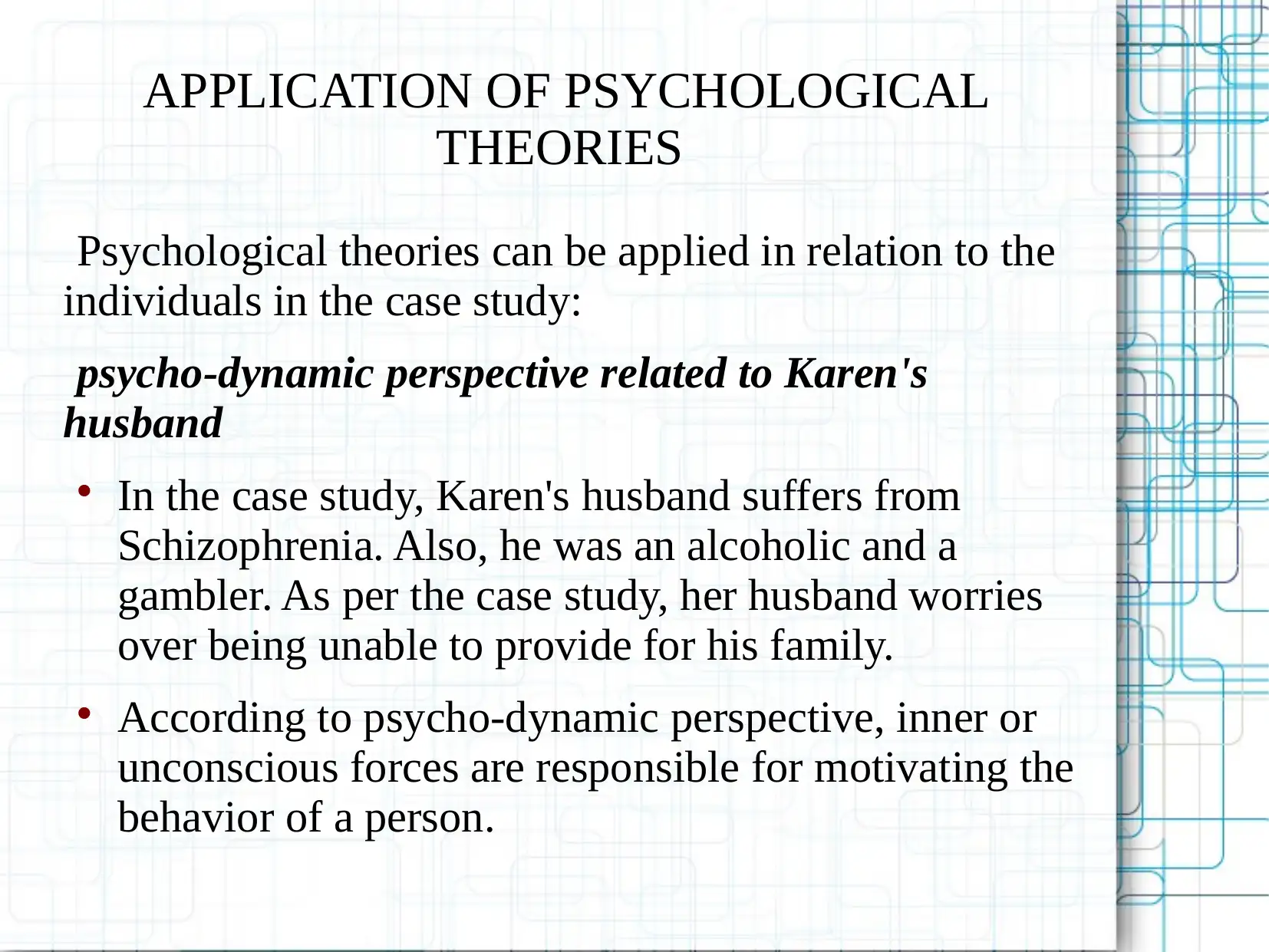
APPLICATION OF PSYCHOLOGICAL
THEORIES
Psychological theories can be applied in relation to the
individuals in the case study:
psycho-dynamic perspective related to Karen's
husband
In the case study, Karen's husband suffers from
Schizophrenia. Also, he was an alcoholic and a
gambler. As per the case study, her husband worries
over being unable to provide for his family.
According to psycho-dynamic perspective, inner or
unconscious forces are responsible for motivating the
behavior of a person.
THEORIES
Psychological theories can be applied in relation to the
individuals in the case study:
psycho-dynamic perspective related to Karen's
husband
In the case study, Karen's husband suffers from
Schizophrenia. Also, he was an alcoholic and a
gambler. As per the case study, her husband worries
over being unable to provide for his family.
According to psycho-dynamic perspective, inner or
unconscious forces are responsible for motivating the
behavior of a person.
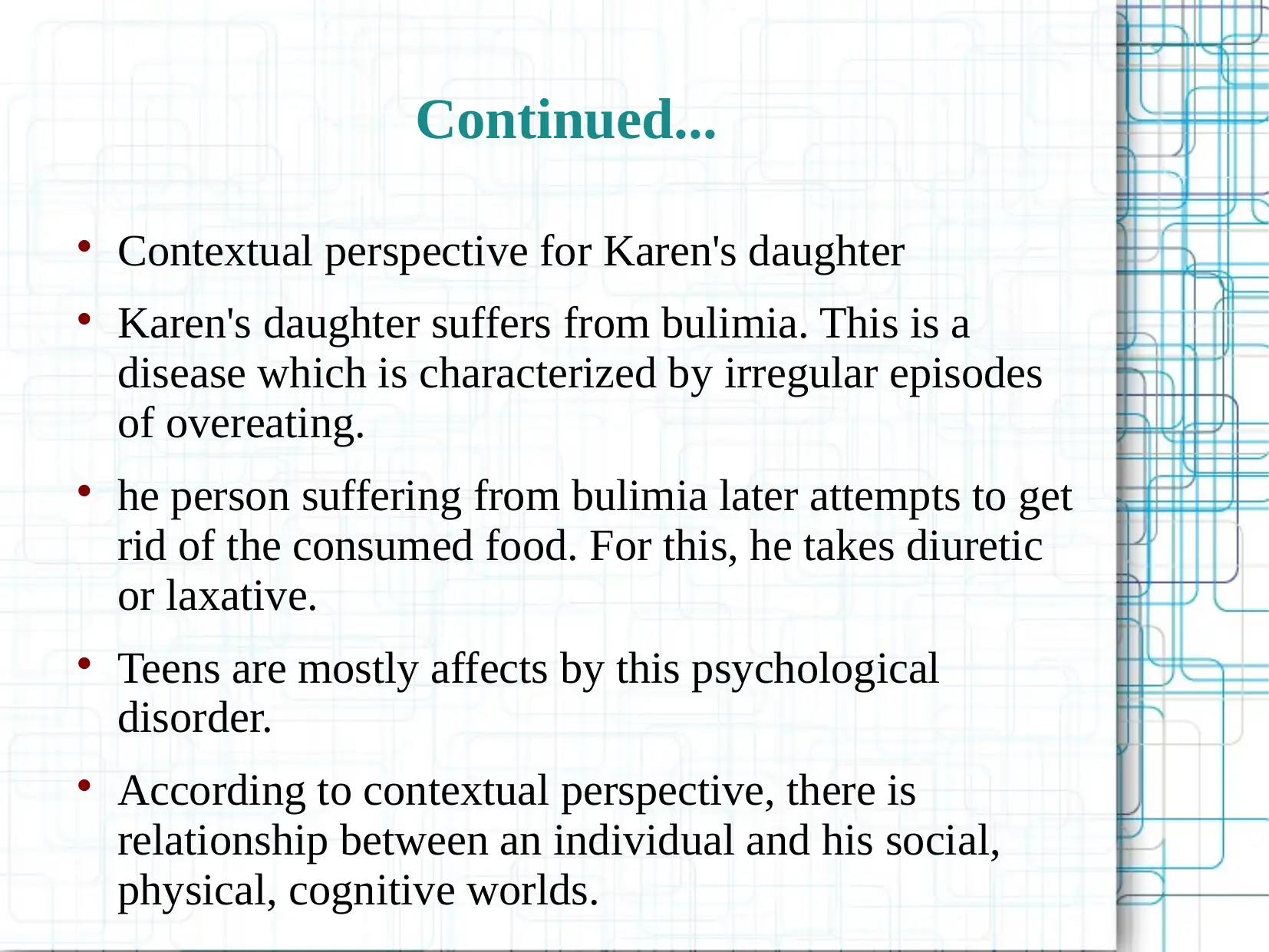
Continued...
Contextual perspective for Karen's daughter
Karen's daughter suffers from bulimia. This is a
disease which is characterized by irregular episodes
of overeating.
he person suffering from bulimia later attempts to get
rid of the consumed food. For this, he takes diuretic
or laxative.
Teens are mostly affects by this psychological
disorder.
According to contextual perspective, there is
relationship between an individual and his social,
physical, cognitive worlds.
Contextual perspective for Karen's daughter
Karen's daughter suffers from bulimia. This is a
disease which is characterized by irregular episodes
of overeating.
he person suffering from bulimia later attempts to get
rid of the consumed food. For this, he takes diuretic
or laxative.
Teens are mostly affects by this psychological
disorder.
According to contextual perspective, there is
relationship between an individual and his social,
physical, cognitive worlds.
⊘ This is a preview!⊘
Do you want full access?
Subscribe today to unlock all pages.

Trusted by 1+ million students worldwide
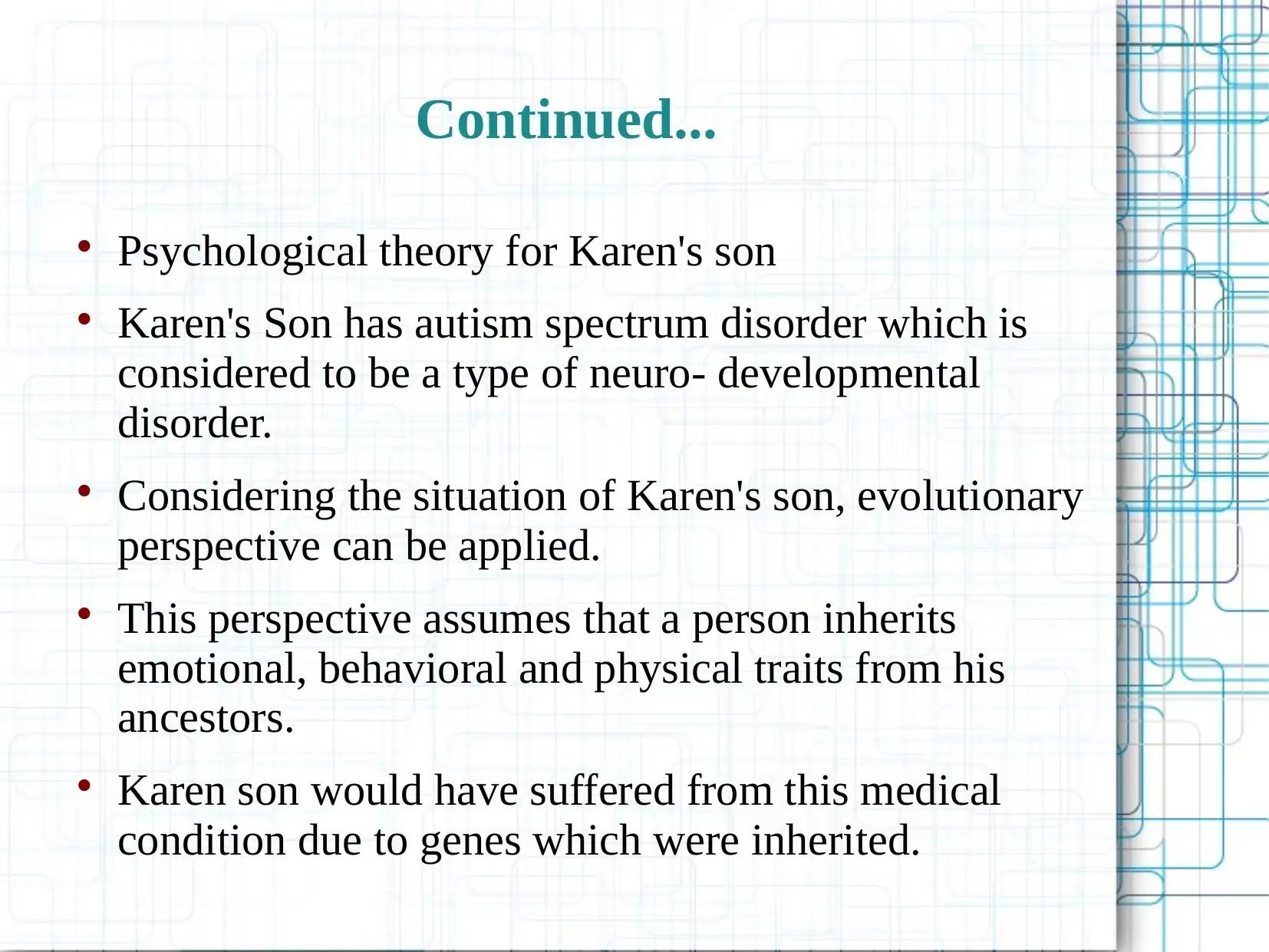
Continued...
Psychological theory for Karen's son
Karen's Son has autism spectrum disorder which is
considered to be a type of neuro- developmental
disorder.
Considering the situation of Karen's son, evolutionary
perspective can be applied.
This perspective assumes that a person inherits
emotional, behavioral and physical traits from his
ancestors.
Karen son would have suffered from this medical
condition due to genes which were inherited.
Psychological theory for Karen's son
Karen's Son has autism spectrum disorder which is
considered to be a type of neuro- developmental
disorder.
Considering the situation of Karen's son, evolutionary
perspective can be applied.
This perspective assumes that a person inherits
emotional, behavioral and physical traits from his
ancestors.
Karen son would have suffered from this medical
condition due to genes which were inherited.
Paraphrase This Document
Need a fresh take? Get an instant paraphrase of this document with our AI Paraphraser
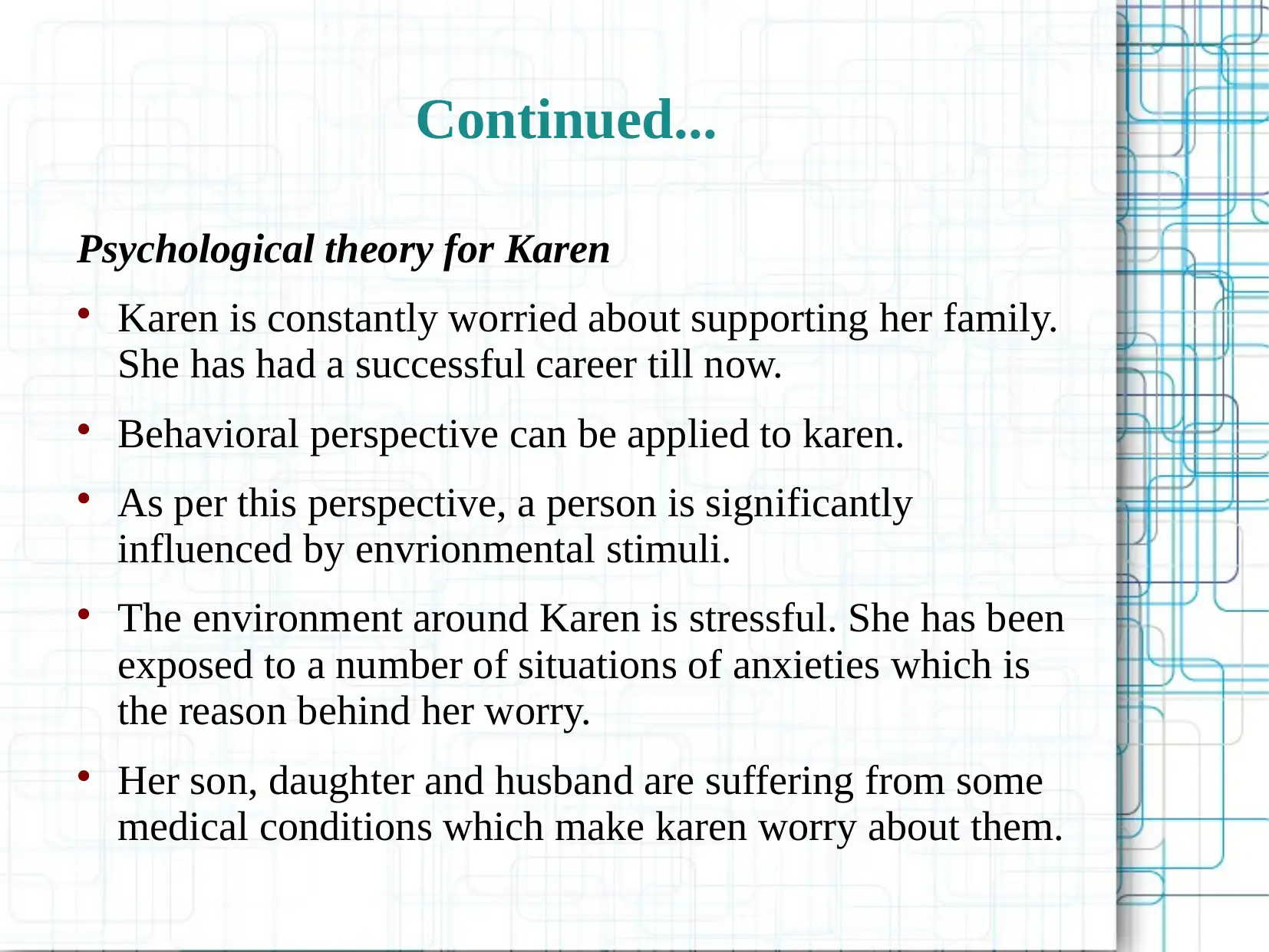
Continued...
Psychological theory for Karen
Karen is constantly worried about supporting her family.
She has had a successful career till now.
Behavioral perspective can be applied to karen.
As per this perspective, a person is significantly
influenced by envrionmental stimuli.
The environment around Karen is stressful. She has been
exposed to a number of situations of anxieties which is
the reason behind her worry.
Her son, daughter and husband are suffering from some
medical conditions which make karen worry about them.
Psychological theory for Karen
Karen is constantly worried about supporting her family.
She has had a successful career till now.
Behavioral perspective can be applied to karen.
As per this perspective, a person is significantly
influenced by envrionmental stimuli.
The environment around Karen is stressful. She has been
exposed to a number of situations of anxieties which is
the reason behind her worry.
Her son, daughter and husband are suffering from some
medical conditions which make karen worry about them.
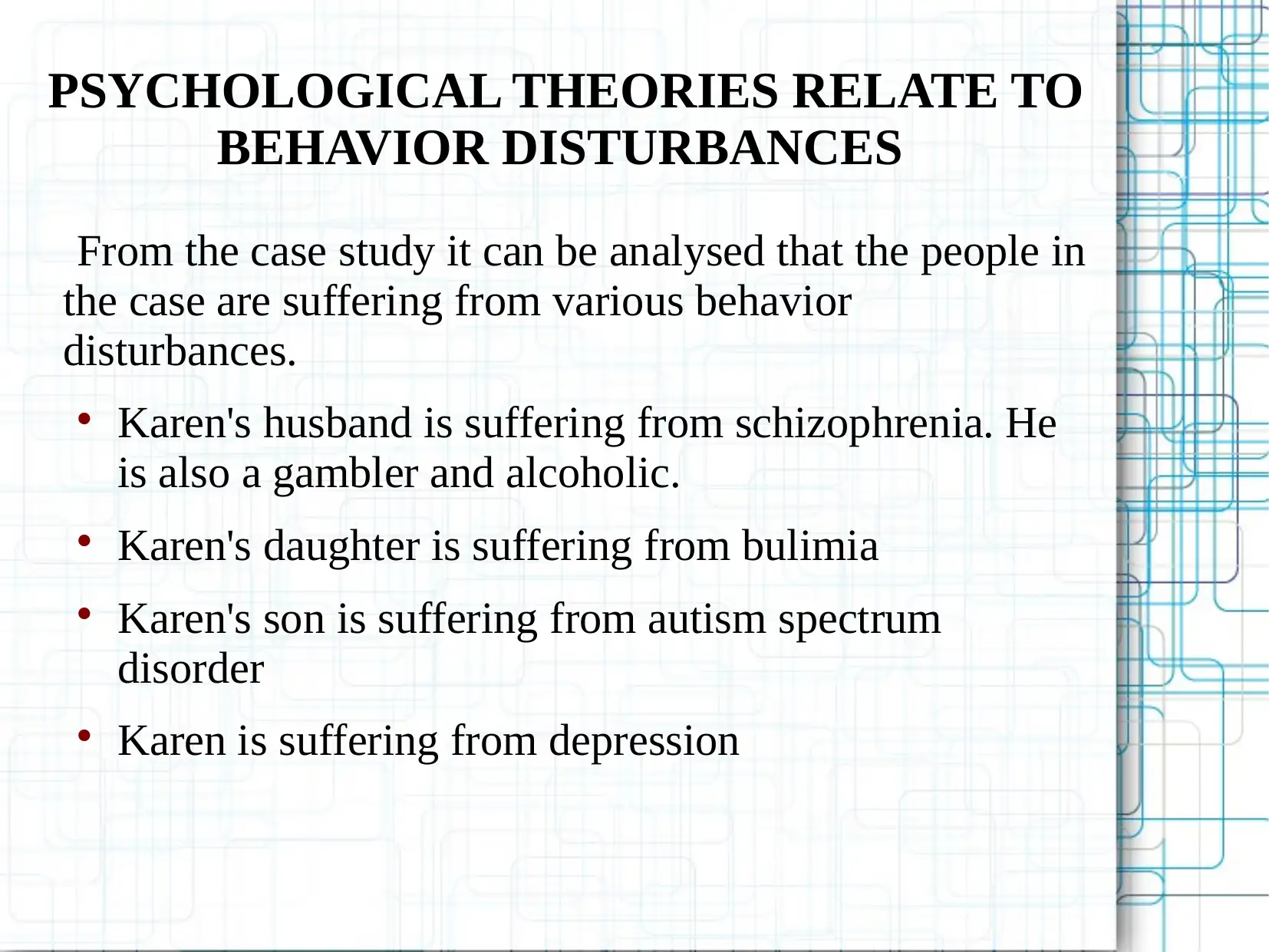
PSYCHOLOGICAL THEORIES RELATE TO
BEHAVIOR DISTURBANCES
From the case study it can be analysed that the people in
the case are suffering from various behavior
disturbances.
Karen's husband is suffering from schizophrenia. He
is also a gambler and alcoholic.
Karen's daughter is suffering from bulimia
Karen's son is suffering from autism spectrum
disorder
Karen is suffering from depression
BEHAVIOR DISTURBANCES
From the case study it can be analysed that the people in
the case are suffering from various behavior
disturbances.
Karen's husband is suffering from schizophrenia. He
is also a gambler and alcoholic.
Karen's daughter is suffering from bulimia
Karen's son is suffering from autism spectrum
disorder
Karen is suffering from depression
⊘ This is a preview!⊘
Do you want full access?
Subscribe today to unlock all pages.

Trusted by 1+ million students worldwide
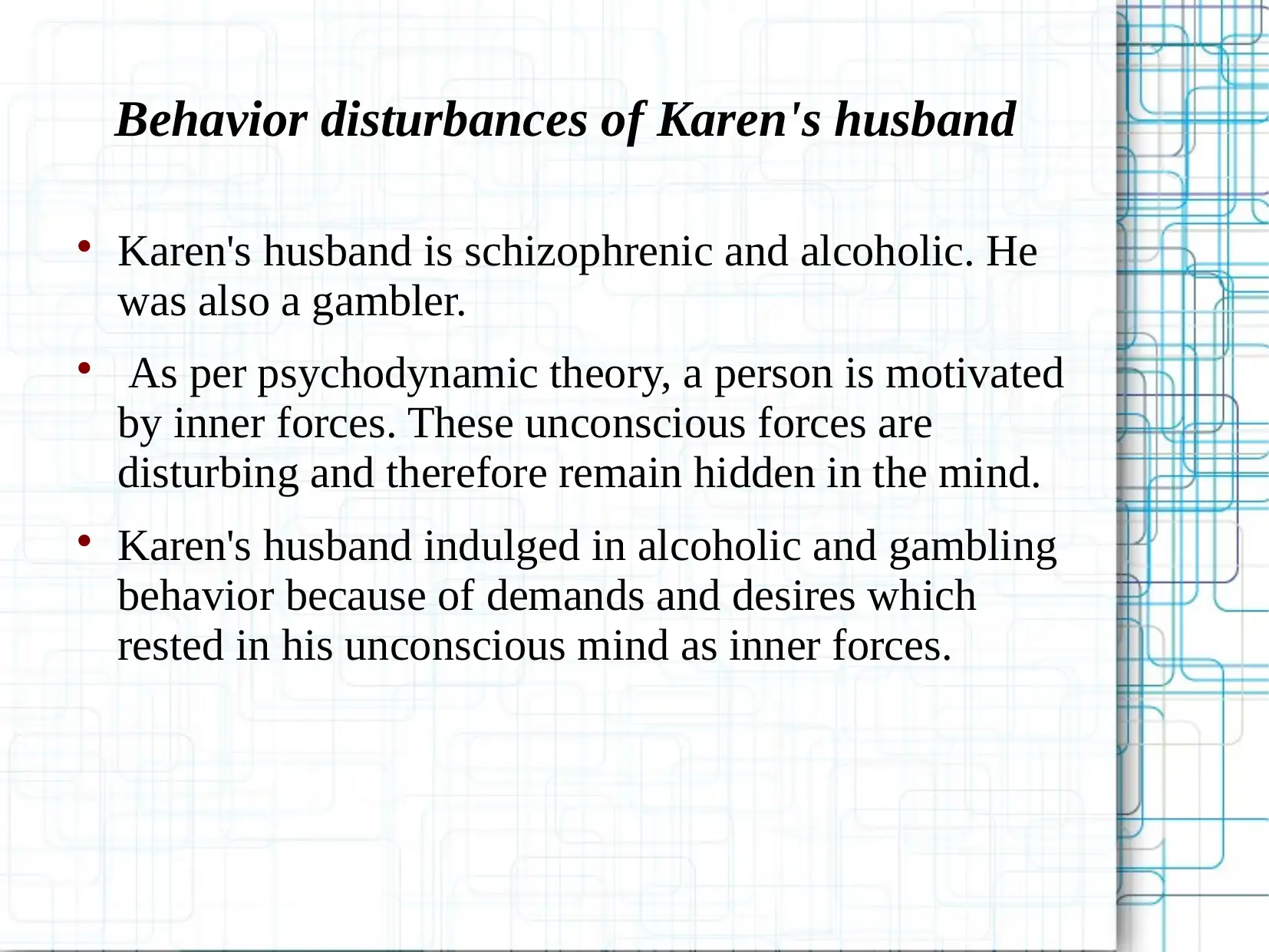
Behavior disturbances of Karen's husband
Karen's husband is schizophrenic and alcoholic. He
was also a gambler.
As per psychodynamic theory, a person is motivated
by inner forces. These unconscious forces are
disturbing and therefore remain hidden in the mind.
Karen's husband indulged in alcoholic and gambling
behavior because of demands and desires which
rested in his unconscious mind as inner forces.
Karen's husband is schizophrenic and alcoholic. He
was also a gambler.
As per psychodynamic theory, a person is motivated
by inner forces. These unconscious forces are
disturbing and therefore remain hidden in the mind.
Karen's husband indulged in alcoholic and gambling
behavior because of demands and desires which
rested in his unconscious mind as inner forces.
Paraphrase This Document
Need a fresh take? Get an instant paraphrase of this document with our AI Paraphraser
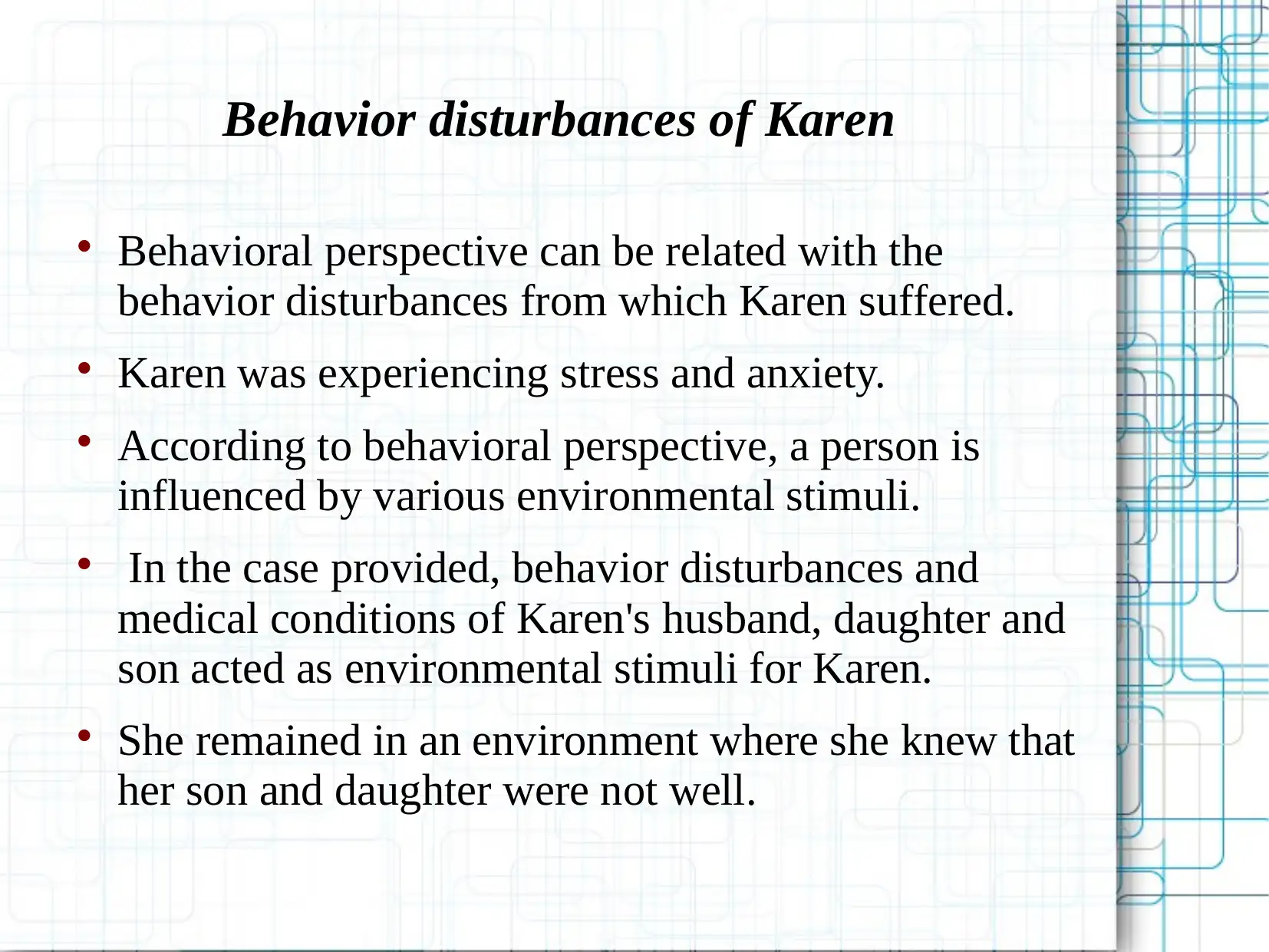
Behavior disturbances of Karen
Behavioral perspective can be related with the
behavior disturbances from which Karen suffered.
Karen was experiencing stress and anxiety.
According to behavioral perspective, a person is
influenced by various environmental stimuli.
In the case provided, behavior disturbances and
medical conditions of Karen's husband, daughter and
son acted as environmental stimuli for Karen.
She remained in an environment where she knew that
her son and daughter were not well.
Behavioral perspective can be related with the
behavior disturbances from which Karen suffered.
Karen was experiencing stress and anxiety.
According to behavioral perspective, a person is
influenced by various environmental stimuli.
In the case provided, behavior disturbances and
medical conditions of Karen's husband, daughter and
son acted as environmental stimuli for Karen.
She remained in an environment where she knew that
her son and daughter were not well.
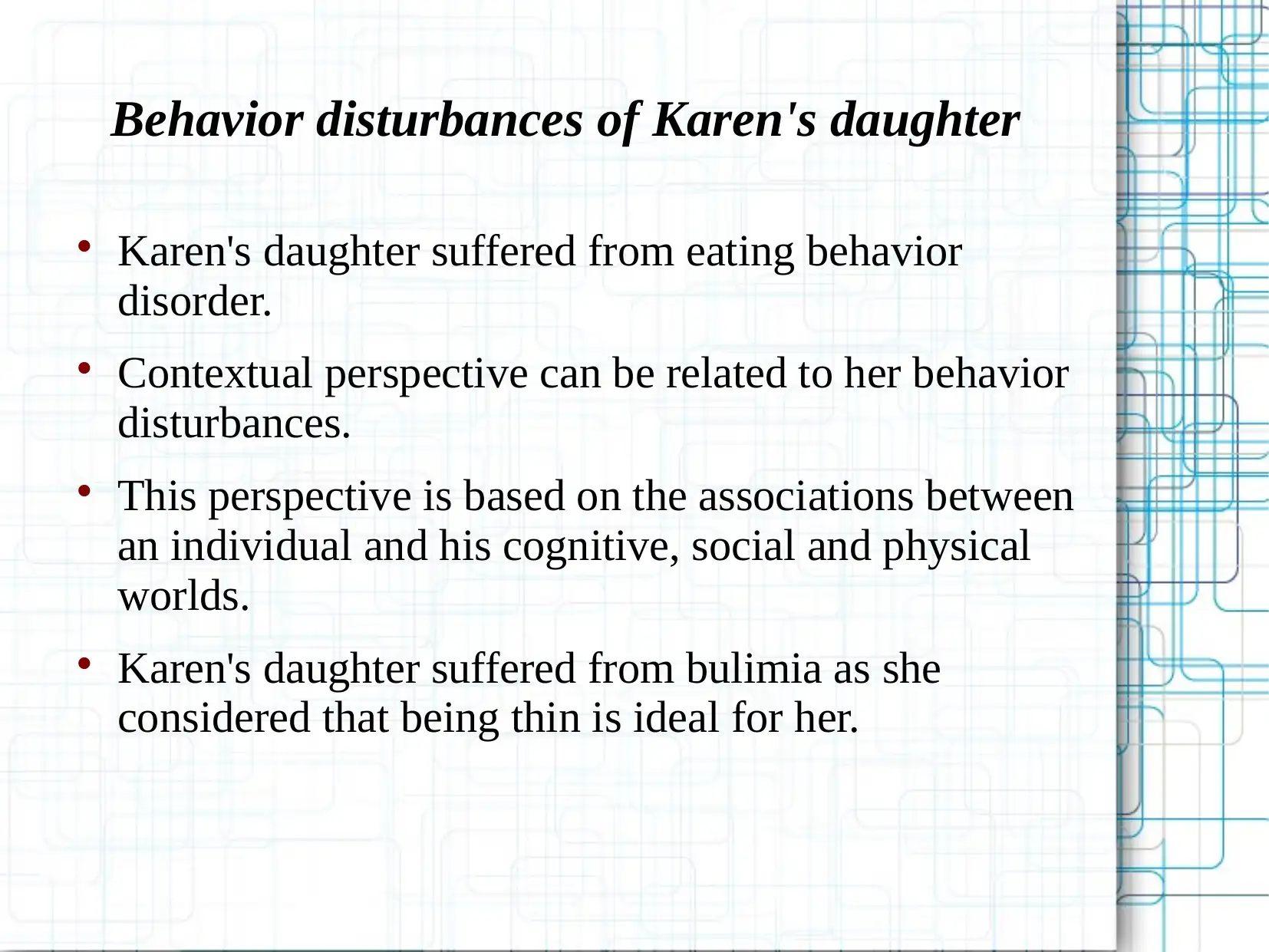
Behavior disturbances of Karen's daughter
Karen's daughter suffered from eating behavior
disorder.
Contextual perspective can be related to her behavior
disturbances.
This perspective is based on the associations between
an individual and his cognitive, social and physical
worlds.
Karen's daughter suffered from bulimia as she
considered that being thin is ideal for her.
Karen's daughter suffered from eating behavior
disorder.
Contextual perspective can be related to her behavior
disturbances.
This perspective is based on the associations between
an individual and his cognitive, social and physical
worlds.
Karen's daughter suffered from bulimia as she
considered that being thin is ideal for her.
⊘ This is a preview!⊘
Do you want full access?
Subscribe today to unlock all pages.

Trusted by 1+ million students worldwide
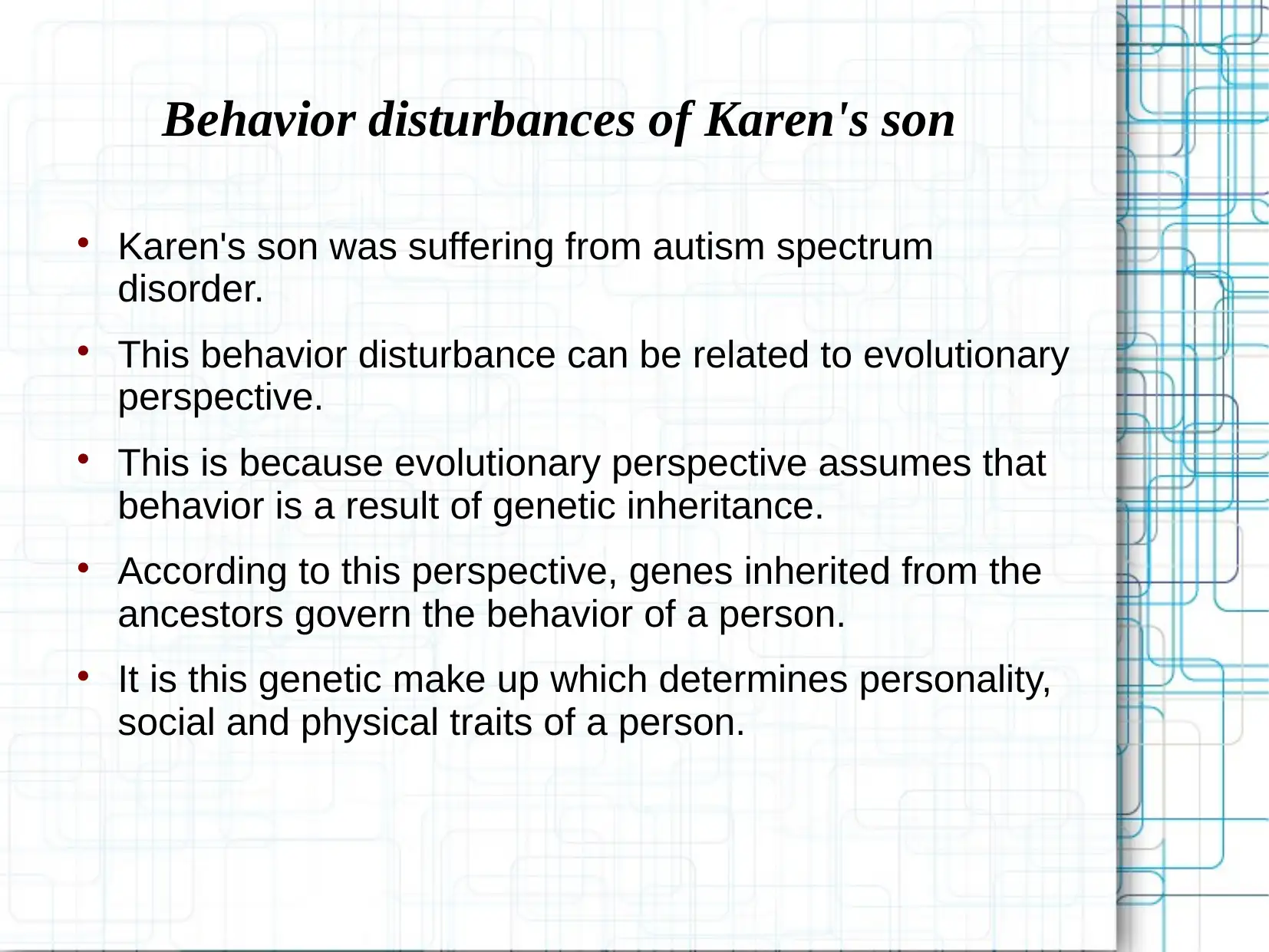
Behavior disturbances of Karen's son
Karen's son was suffering from autism spectrum
disorder.
This behavior disturbance can be related to evolutionary
perspective.
This is because evolutionary perspective assumes that
behavior is a result of genetic inheritance.
According to this perspective, genes inherited from the
ancestors govern the behavior of a person.
It is this genetic make up which determines personality,
social and physical traits of a person.
Karen's son was suffering from autism spectrum
disorder.
This behavior disturbance can be related to evolutionary
perspective.
This is because evolutionary perspective assumes that
behavior is a result of genetic inheritance.
According to this perspective, genes inherited from the
ancestors govern the behavior of a person.
It is this genetic make up which determines personality,
social and physical traits of a person.
Paraphrase This Document
Need a fresh take? Get an instant paraphrase of this document with our AI Paraphraser
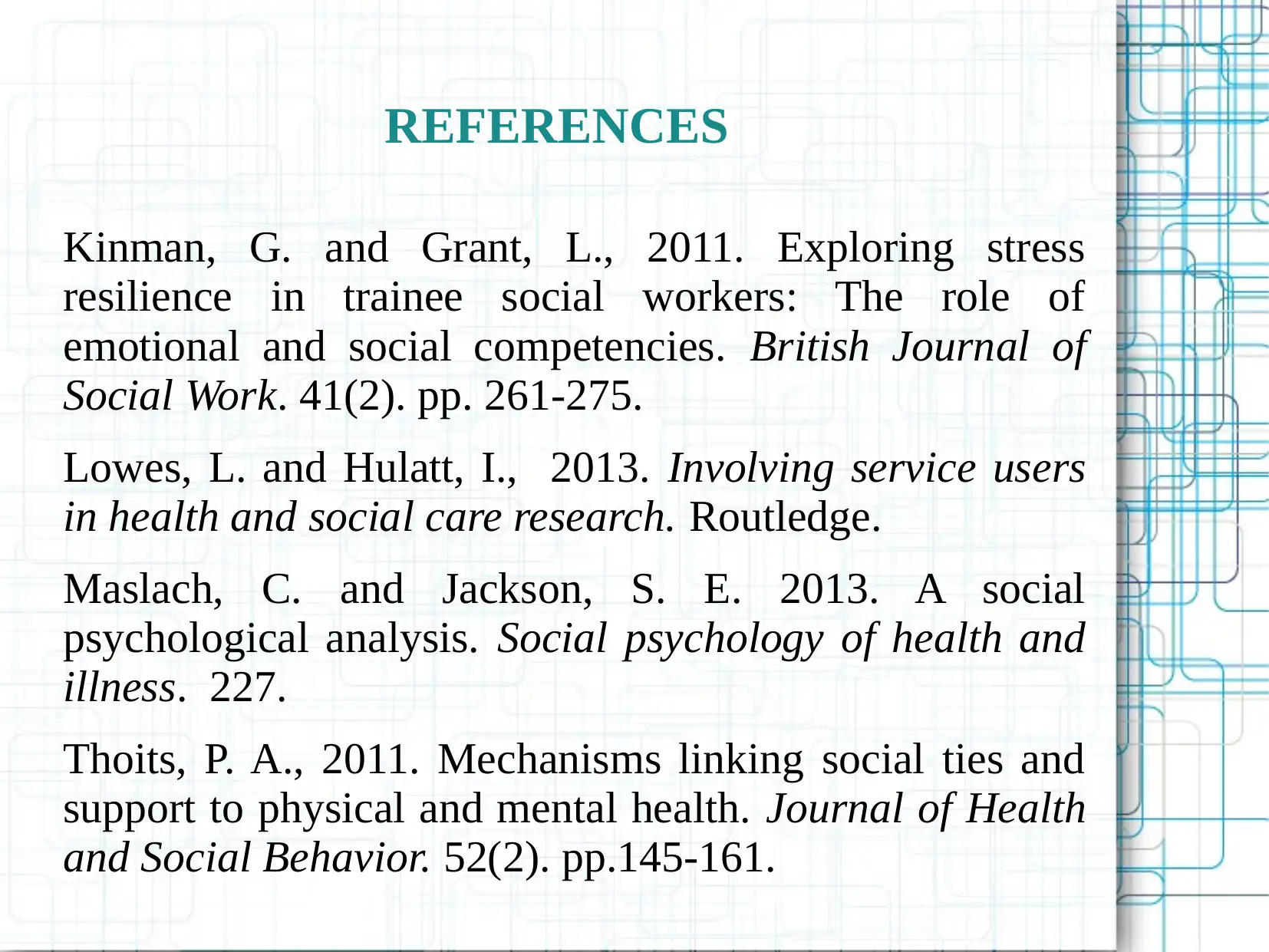
REFERENCES
Kinman, G. and Grant, L., 2011. Exploring stress
resilience in trainee social workers: The role of
emotional and social competencies. British Journal of
Social Work. 41(2). pp. 261-275.
Lowes, L. and Hulatt, I., 2013. Involving service users
in health and social care research. Routledge.
Maslach, C. and Jackson, S. E. 2013. A social
psychological analysis. Social psychology of health and
illness. 227.
Thoits, P. A., 2011. Mechanisms linking social ties and
support to physical and mental health. Journal of Health
and Social Behavior. 52(2). pp.145-161.
Kinman, G. and Grant, L., 2011. Exploring stress
resilience in trainee social workers: The role of
emotional and social competencies. British Journal of
Social Work. 41(2). pp. 261-275.
Lowes, L. and Hulatt, I., 2013. Involving service users
in health and social care research. Routledge.
Maslach, C. and Jackson, S. E. 2013. A social
psychological analysis. Social psychology of health and
illness. 227.
Thoits, P. A., 2011. Mechanisms linking social ties and
support to physical and mental health. Journal of Health
and Social Behavior. 52(2). pp.145-161.

THANK YOU
⊘ This is a preview!⊘
Do you want full access?
Subscribe today to unlock all pages.

Trusted by 1+ million students worldwide
1 out of 12
Your All-in-One AI-Powered Toolkit for Academic Success.
+13062052269
info@desklib.com
Available 24*7 on WhatsApp / Email
![[object Object]](/_next/static/media/star-bottom.7253800d.svg)
Unlock your academic potential
Copyright © 2020–2026 A2Z Services. All Rights Reserved. Developed and managed by ZUCOL.